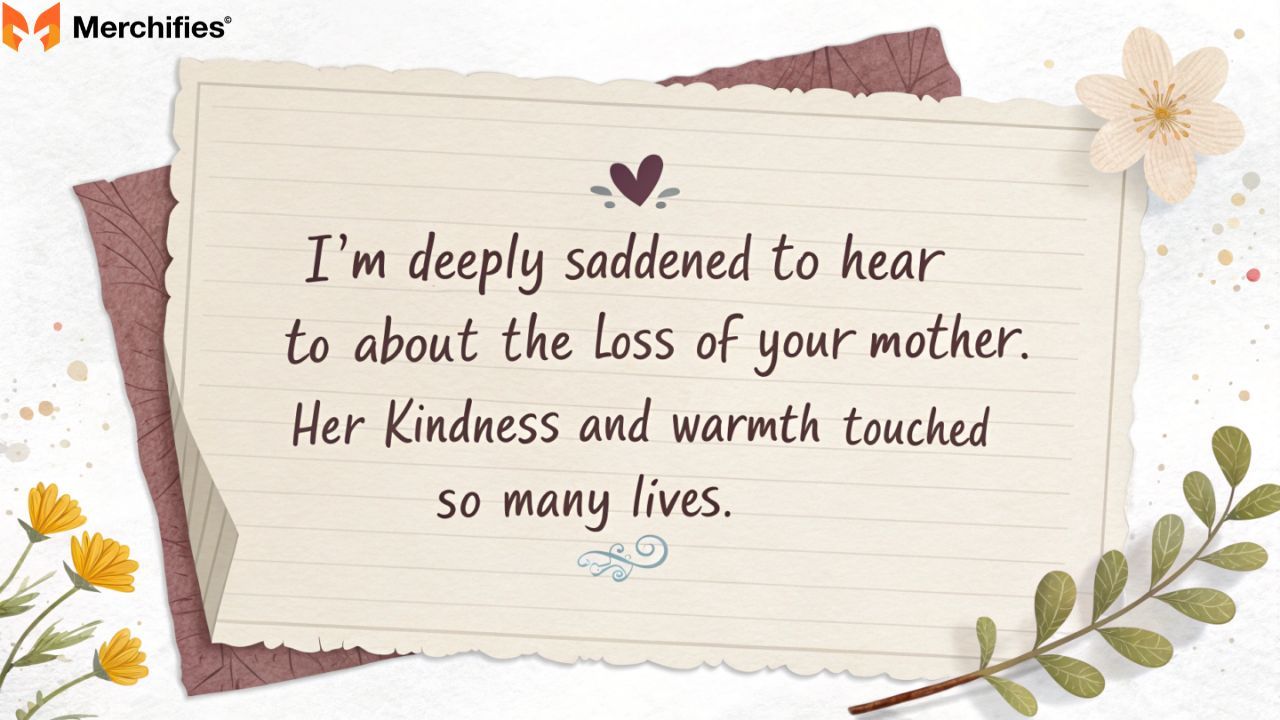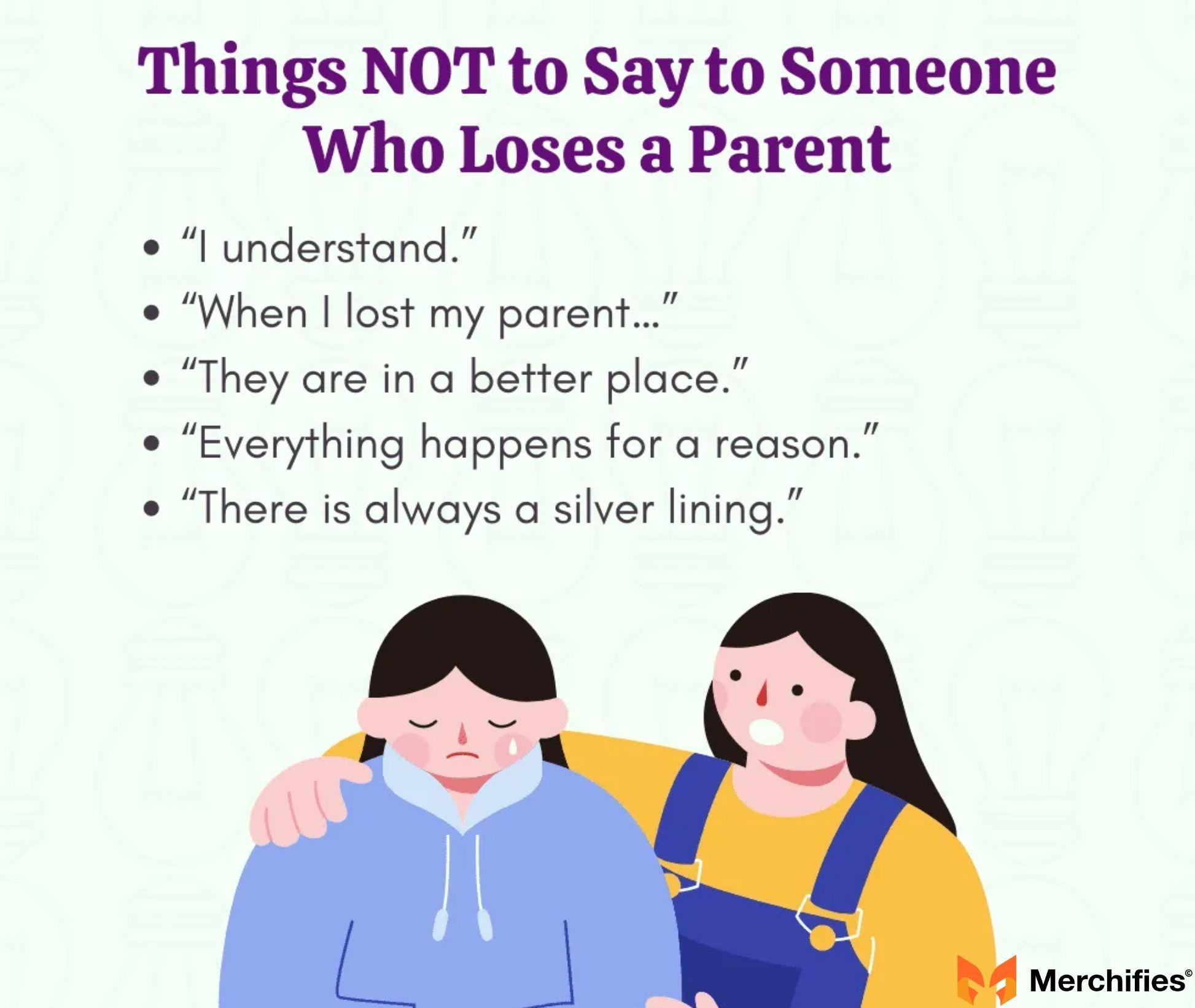-da0801079a650a2e.jpeg)
Comforting Words for the Death of a Mother: Offering Sincere Sympathy and Support
Offer sincere sympathy with comforting words for the death of a mother — gentle guidance to support grieving families with empathy, compassion, and heartfelt expressions of love.

Blog Post Contents
The loss of a mother is one of life's most profoundly painful experiences, leaving an irreplaceable void. It's a grief that touches the deepest parts of our being, marked by a unique blend of love, sorrow, and often, a sense of being unmoored. When someone we care about faces this immense challenge, finding the right comforting words for the death of a mother can feel daunting. We want to help, but fear saying the wrong thing. This guide aims to equip you with empathetic messages, practical advice, and specific phrases to express heartfelt sympathy and support during this difficult time. As renowned relationship expert and grief communication specialist, Hannah Gale, often emphasizes, "It's not about perfect words, but perfect presence and genuine intention."
Navigating the Deepest Grief – The Loss of a Mother
The sorrow that accompanies the death of a mother is unlike any other. It’s a loss that redefines everything, from daily routines to one’s very sense of self. This article understands that profound pain and the unique nature of losing the woman who gave you life, nurtured you, and shaped who you are. Our purpose is clear: to provide guidance and specific comforting words for the death of a mother along with actionable ways you can offer meaningful support. We'll help you navigate the delicate balance of offering solace, always emphasizing that sincerity and empathy far outweigh the pursuit of perfect phrasing. Your presence and genuine care are the most powerful condolence messages you can offer.
Understanding the Unique Grief of Losing a Mother
The journey of grief is deeply personal, yet certain losses carry a universal weight. The death of a mother stands apart, echoing through every facet of a person's life.
The Irreplaceable Bond
From our earliest memories, a mother often represents a foundational connection – a source of unconditional love, guidance, and comfort. Losing her means severing a primary emotional tie, impacting identity, family dynamics, and daily existence. It’s a void that can feel impossible to fill, creating a unique dimension of sorrow that resonates deeply within the grieving individual.
The Grieving Process
It’s crucial to remember that grief is not a linear process. There’s no right or wrong way to mourn, and timelines are irrelevant. A person experiencing the death of their mother may cycle through denial, anger, bargaining, depression, and acceptance, often revisiting stages unexpectedly. Understanding this non-linear nature is key to providing sustained and empathetic support, recognizing that the need for comforting words for the death of a mother doesn't end after the funeral.
Why Your Words Matter
In the face of such overwhelming sadness, your sincere condolences can serve as a vital lifeline. Even if your words feel inadequate, the act of reaching out and acknowledging their pain can provide immense comfort. It reminds the grieving individual that they are not alone, that their loss is seen and validated. Meaningful words for mother's passing, even simple ones, can offer a small beacon of light in their darkest hours.

What to Say: Specific Comforting Words for the Death of a Mother
When searching for the right things to say, focus on sincerity, acknowledgment, and offering support. Here are some examples of comforting words for the death of a mother:
Expressing Direct Sympathy
Sometimes, the simplest expressions are the most powerful.
- "I am so deeply sorry for your profound loss. My heart breaks for you."
- "My heartfelt condolences go out to you and your entire family during this incredibly difficult time."
- "I can only imagine how difficult this must be, and I am sending you all my love and strength."
Acknowledging Her Life and Legacy
Honoring the departed can be incredibly comforting.
- "Your mother was a truly remarkable woman, and her spirit will be missed by so many."
- "I will always remember [specific positive quality/memory of their mom], like her incredible kindness and infectious laugh."
- "She touched so many lives with her [virtue, e.g., boundless generosity, unwavering strength, gentle wisdom]."

Sharing a Cherished Memory (If Appropriate)
A small, positive anecdote can offer a moment of warmth.
- "I have such fond memories of your mother, especially when [brief, positive anecdote, e.g., she hosted the most wonderful garden parties, or how she always knew how to make everyone feel special]."
- "She always made me feel so [feeling – e.g., welcome, happy, seen] whenever I saw her, and I'll cherish those moments." Remember to keep the memory brief and focused on positive traits or shared experiences.
Offering Practical Support (Beyond Just Words)
Often, actions speak louder than words.
- "Please let me know if there's anything at all I can do to help, no matter how small. I'm serious."
- "I'd love to bring over a meal next week/help with errands this weekend/watch the kids if you need a break. Just text me if that would be helpful."
- "There's no need to respond to this, but just know I'm thinking of you and sending positive energy your way."

Words of Comfort and Hope (Sensitive Approach)
These phrases offer solace without minimizing grief.
- "May her memory be a blessing and a source of comfort to you always."
- "She will always live on in your heart, through your memories, and through the beautiful lives she touched."
- "Please take all the time you need to grieve. There's no rush or right way to navigate this."
How to Deliver Your Comforting Words
The manner in which you offer your sympathy messages for loss of mother can be as impactful as the words themselves.
In Person
When you're face-to-face, your presence is paramount.
- Be present and listen: Sometimes, just listening without offering advice is the greatest gift.
- A warm hug: If appropriate and comfortable for both parties, a gentle hug can convey immense warmth.
- Maintain eye contact, offer a gentle touch: These non-verbal cues communicate empathy and connection.
Condolence Cards & Letters
A handwritten card often feels more personal and lasting.
- Handwritten is often more personal: It shows you took the time and care.
- Keep it concise and heartfelt: A few sincere sentences are better than a long, rambling message.
- Include a specific memory if possible: This personal touch makes the message more meaningful.

Example templates/phrases for cards:
- "Dearest [Name], My heart aches for you and your family during this time of profound loss. Your mother, [Mother's Name], was such a bright light. I will always remember her incredible [quality]. Please accept my deepest sympathies. Sending you strength and comfort."
- "To [Name], I was so saddened to hear about the passing of your dear mother. She was a truly special person who brought so much joy to those around her. I'm thinking of you and sending all my love. With deepest sympathy."
Text Messages & Emails
These are effective for initial outreach or when distance is a factor.
- Good for initial outreach: Especially if you're geographically distant or unsure if they're up for a call.
- Keep it brief and sincere: Avoid lengthy paragraphs.
- Offer a follow-up call if desired: "No need to reply, but I'd love to call later in the week if you're up for it."
Social Media
Navigating social media condolences requires sensitivity.
- Be mindful of public vs. private messages: A direct message is often more appropriate for personal condolences than a public wall post.
- Keep posts respectful and avoid oversharing: This is not the time to share your own lengthy personal stories.
- Consider direct messaging for more personal condolences: It's less performative and more intimate.

What NOT to Say (and Why to Avoid It)
Equally important as knowing what to say is understanding what to avoid. These phrases, though often well-intentioned, can inadvertently cause more pain. As Hannah Gale often advises her clients, "The goal is to validate their pain, not diminish it."
Platitudes & Clichés
These phrases can sound dismissive of the grieving person's reality.
- "She's in a better place." (This can be dismissive of their current pain and belief system.)
- "Everything happens for a reason." (Can feel invalidating when someone is questioning the very meaning of life.)
- "Be strong." (This can put immense pressure on the grieving person to suppress their emotions.)
Minimizing the Loss
These phrases imply their grief isn't valid or significant.
- "At least she lived a long life." (Doesn't diminish the profound pain of losing a loved one, regardless of age.)
- "You'll get over it." (Grief isn't something one simply "gets over"; it's a process of integrating loss.)
Focusing on Yourself
The focus should always remain on the grieving individual.
- "I know exactly how you feel." (Even if you've experienced a similar loss, everyone's grief journey is unique. It can shift the focus away from them.)
- Avoid sharing your own unrelated grief stories: Unless specifically asked or it's a very brief, highly relevant shared experience, keep the spotlight on their loss.
Demanding a Response
Grieving individuals often lack the energy to respond or coordinate help.
- "Let me know if you need anything!" (Without specific follow-through, this puts the burden on them to ask.)
- "Are you okay?" (While well-meaning, it's often better to offer specific, unconditional support rather than a question they might feel pressured to answer positively.)

Beyond Words: Long-Term Support for Grieving Individuals
Support doesn't end after the funeral. The weeks, months, and even years following the death of a mother can be incredibly challenging.
Continued Presence
The initial outpouring of support often fades, but the grief does not.
- Checking in periodically: A simple text or call a few weeks or months later can mean the world.
- Remembering significant dates: This includes birthdays, death anniversaries, and holidays which can be particularly tough. A quick message like "Thinking of you today, on what would have been your mom's birthday" shows deep care.
Practical Help Over Time
Ongoing, concrete assistance is invaluable.
- Offering to help with chores: Grocery shopping, house cleaning, or yard work can be overwhelming for someone grieving.
- Meals: A homemade meal delivered a month or two down the line can be a huge relief.
- Just being a listener: Sometimes, all they need is a safe space to talk about their mother, their grief, or anything at all, without judgment or expectation. This long-term grief support after mother's death is crucial.
Encouraging Professional Support
Gently suggesting grief counseling or support groups can be a vital step if you notice prolonged distress or isolation. Frame it as a source of additional strength and tools, rather than implying something is "wrong." Many find solace in a community of shared experience or with a trained professional.

Conclusion: The Power of Presence and Sincere Compassion
Finding the comforting words for the death of a mother is less about crafting a perfect speech and more about demonstrating genuine intent and a compassionate heart. As Hannah Gale reiterates, the profound impact of someone truly showing up, listening, and offering consistent support far surpasses any perfectly worded phrase. Your presence, your empathy, and your unwavering support are often more powerful than any words could ever be. Be kind to yourself as you extend kindness to others, understanding that your genuine effort to connect makes all the difference in helping someone navigate the unimaginable pain of losing their mother.
-d4c38c342cdf20ca.jpeg)


-b555fcc6b204c456.jpeg)




